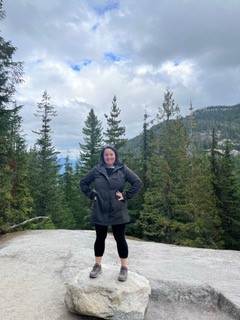“The local authority doesn’t profit in any way from fostering, which was important to me.”
Ashleigh became a foster carer in 2018 and has provided short term placements, respite and longer term placements for children aged 6-17. She is currently approved to care for 2 children which includes being a MyST carer for 1 child. We spoke to Ashleigh about her decision to foster for the local authority and what she ‘brings to the table’ as a foster carer.
What led you to become a foster carer?
“I already worked in the field with vulnerable children, but as rewarding as that was, I knew I wanted to do more. I saw children who just needed a safe place, a trusted adult to help guide them and a supportive loving home and knew I had the skills and home environment to provide that. I also had several foster carer friends, who made it look a breeze and great fun!! There was one young person in particular, however, that was the catalyst. I had been working with them for 2 years and built a relationship up to a point where they disclosed the realities of their home life. I perused the usual referral routes but, as they were 16, there was very limited support available and I just wanted to take them home, but I couldn’t. I knew then that I wanted to become a foster carer to help young people like them.”
Why did you choose to foster for the LA and what support do you get?
“The local authority was a critical choice in becoming a foster carer for me and I considered all avenues. Despite, at the time, being able to ‘earn’ more with an agency, (I stress that this is not the case now – fostering payments are equitable across the sector now, and rightly so. No one should profit from vulnerable children), the local authority provided an environment that better suited my needs and personality. Firstly, the local authority doesn’t profit in any way from fostering, which was important to me. In addition to this, I am a single, working foster carer and my job was hugely important to me, as I help more children than those I foster (and a job is important, as the income from fostering is not as secure as traditional paid work – you do have bills to consider!). The local authority work around your working commitments (although I did go part time, which I would always advocate!) and are fully supportive of my work, understanding the importance of it and accommodating meetings around work. The level of support provided by the local authority is better, as there is a huge team consisting of Supervising Social Workers, the children’s Social Workers and other professionals, all of whom know you and your children. I can ring the duty line at any point and the person on the other end always seems to know who I am and is helpful, cheerful and supportive!
The most critical element for me was the matching process; by fostering with the local authority, you have a better chance of achieving a better match with children, as they try to find homes in-house before seeking elsewhere. Good matching is so important and can mean the difference between a successful home environment or a more stressful one. The local authority team are fantastic at knowing your skills, your personality and matching children who would benefit and thrive in your care, which leads to an ultimately more rewarding and positive experience for everyone!
The local authority gives a huge amount of support in practical terms, for example, regular support groups, coffee mornings, family events, mentoring (particularly useful!) and a large suite of training courses. There is an out of hours duty line which is open 7 days a week until 12pm for when the office is closed and an emergency line as well for after 12pm. Your own Supervising Social Worker provides a huge amount of support, as do the wider team. As a MYST (therapeutic) foster carer you get 24 hour wraparound practical support as well and access to more in-depth psychological support.”
What is it like to be a foster carer and which age children do you foster?
“Being a foster carer is the most rewarding thing that I do. I can see the difference I make when I get to work with children over a long time. I’ve been a mainstream foster carer for 6 years and recently become a MYST carer, so I foster children who have complex emotional, social and behavioural needs. I foster children aged 5-18 but focus on older children generally. Teenagers are really fun – once you break down the barriers they have! I find they can give you more flexibility as they are more independent, they want a trusted adult they can rely on, not a ‘parent’ figure, a safe home they can come back to and lots of readily available food!”
What particular fostering moment has stuck with you?
“Gosh, there are too many to recount! I think some key moments, though, are the first time a child came to me independently for nurture after a meltdown and wanted reassurance. I realised I had become a safe person for that child. The first time a child tells you they love you is always awesome because you know they have started to develop an attachment with you, which means they feel secure. Perhaps a funny moment would be when I was teaching a young person to run a bath for themselves and after 10 minutes they came to me totally bewildered saying the water just wouldn’t stay in the bath…. I’d forgotten to tell them to put the plug in!!! We both laughed so hard!”
The importance of self-care
“Self-care is genuinely one of the most important things a foster carer can do to be the best they can be. I see it as a duty to myself and my children to be mentally well and resilient so they can rely on me. It’s often the one thing that foster carers will neglect, as they are too busy giving back to others! Self-care is NOT a luxury and taking time to replenish your own cup of wellbeing is not being lazy or neglecting your duties – it’s an essential – it’s role modelling compassion to yourself. It’s not always easy to fit in but I go for a run (well a fast walk really!) 4 times a week and I organise meetings around this. I prioritise meeting up with friends and family every few weeks, so I get ‘me’ time. Over the years, I have learnt to ask for this time and support to achieve it!”
Rewards and challenges
“There are so many rewards and challenges but seeing children develop and start to feel safe with you is one of the biggest rewards I get. That sense of achievement and breaking through those walls of mistrust; it just can’t be beaten!
Another huge reward is seeing the children I’ve cared for transition to better environments, whether that is returning home or simply moving through a difficult phase and knowing I’ve had an influence in their ability to manage that, is fantastic!
I find time is often my biggest challenge – it’s not a job, it’s a lifestyle and one which impacts on every aspect of my life. It takes a lot of organisation to balance competing priorities, particularly with wider family and friends! Making sure my family and friends have a good understanding of fostering is critical to supporting me with this and making sure I take some time to prioritise those relationships occasionally is also key – otherwise you end up isolated and that benefits no-one!
The other biggest challenge I personally find links to the emotional attachment I always end up feeling for the children I care for! I always end up being totally attached and while I think that makes me a good foster carer and the children know how loved they are, it can be emotionally challenging when they leave to go somewhere else and when you know they have their own family which will always take priority over you! I find having a good relationship with their birth families helps immensely with this. I think understanding that often the lives of birth families can be very difficult and seeing you as a part of the support provided to the child’s wider family, enables positive relationships and helps them to see you as someone who is giving loving care to their child. This also helps me manage my own emotional wellbeing.”
What would you say to anyone considering becoming a foster carer.
“If you are thinking about becoming a foster carer, these are the top tips I would give you:
- Read as much as you possibly can on therapeutic parenting and attachment.
- Have an understanding and learn how to work with birth families positively.
- Teenagers need flexibility but can, also, give you more flexibility than younger children and they are a lot of fun.
- Really consider your wider support network and ensure they understand what this might mean for you and your time.
- Speak to other foster carers about what fostering looks like in real life, day to day.
- Think about your life currently and how you will accommodate a child who will have more needs than other children, i.e. If you work- can you go part time? How flexible is your time? Where can you compromise?
- Consider from the very start what you will do to look after yourself and prioritise that.
- DO IT! We need more foster carers and it is one of the most rewarding things you will ever do!”
If you would like to know more about fostering for your local authority visit https://fosterwales.torfaen.gov.uk/en/ or get in touch to request a call back and start the conversation about your road to fostering:
Email: fosterwalestorfaen@torfaen.gov.uk

Tel: 01495 766669

